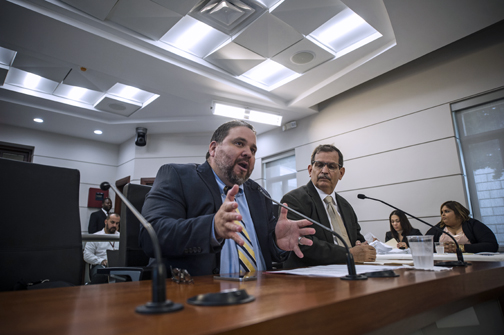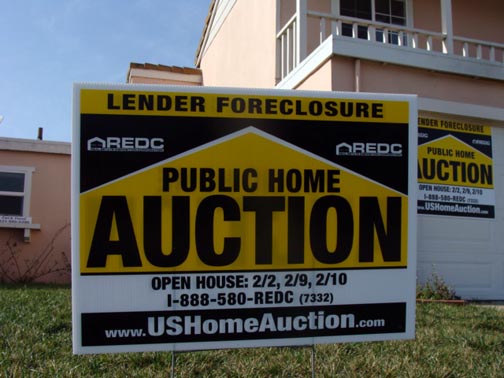Legal group predicts avalanche of foreclosures in P.R. this year

Mortgage foreclosures in Puerto Rico are at critical levels, with great repercussions for Puerto Rican society, contrary to the panorama official figures paint, accordig to an analysis from nonprofit organization Legal Help Puerto Rico.
Ariadna Godreau-Aubert, executive director of the non-profit organization, explained that “the crisis does not affect all people alike. People suffer as well as entities, but there are more vulnerable and they tend to face this painful process alone, and it doesn’t have to be like this. They have rights and options and must receive help.”
“Hurricane María left 300,000 houses affected, in an island already suffering from an economic crisis, with a poverty level between 42% and 53% of its population,” said Godreau-Aubert.
“In 2017, the year of Hurricanes Irma and María, there were 16 foreclosures registered per day. This year, January and February alone, 459 homes were executed by the banks, which is alarming, and motivated us to create this protocol to help both individuals and institutions to face the situation,” she said.
Godreau-Aubert, along with attorneys Ricardo Ramos, director of the Mortgage Foreclosures Clinic at the University of Puerto Rico Law School, and Tania Morales-Cruz, LHPR’s public policy owner analyst, revealed that the real figures transcend those published by the Office of the Commissioner of Financial Institutions, known as OCIF, which do not include cases filed at the federal bankruptcy court.
LHPR analyzed all figures for: mortgages more than 90 days overdue; bankruptcies, accounts sold to other financial institutions, properties on auction, under execution, submitted to the Federal Court, and in default. All cases total more than 250,260 homes at risk.
“Official data doesn’t say it all,” Ramos said. “According to OCIF, the number of homes executed by the banks, between 2016 and 2018, has dropped, but that’s an artificial depletion as OCIF does not include sold loans or bankruptcy court cases, neither auctions or reverse mortgages.”
Ramos explained that an increase was expected in 2017, but moratoriums on mortgage payments and temporary closure of courts postponed cases, creating an artificial decline.
Problems of access to justice further exacerbate the situation for the population, the group said.
“So, as the information is very technical; often in English, the orientation by banks is inadequate, lack of education and legal representation, and the situation causes great emotional weight, a lot of people face this process alone and it doesn’t have to be like this,” said Godreau-Aubert.
The organization declared this crisis a “national emergency” for it estimates that more than 25% of the population, more than 750,000 people, are affected. They stressed that there are more than 250,260 homes at risk of execution.
Consumers have options The organization’s “first aid protocol” recommends several steps for service provider institutions to properly identify and channel foreclosure cases, and for mortgage owners to know what options they have.
“We want people to know their rights and receive the legal accompaniment they need. We are concerned that vulnerable groups, such as seniors, people with functional diversity, women, receive the necessary assistance,” according to the protocol document.
In most cases it is possible to detect when a person is at risk of having their home foreclosed. If the person has not failed to comply with a payment but is contemplated that they will eventually have difficulty meeting it, the bank may be asked to negotiate to improve the conditions of the mortgage and save the property. No one can be removed from their home by the bank. A court process is required to start and be completed, the document says.
LHPR’s protocol covers topics such as: telephone calls, guidance, judicial process, alternatives before foreclosure, responding to lawsuits, compulsory mediation, sentencing, auctioning, loss mitigation, judicial sale, chronology of events, vulnerable people, and a directory of free legal services, among others.
Call to banks, government The group has made a call to the banking sector to make information more accessible to its clientele and to adopt social responsibility criteria, as well as a call to the government to “declare a state of emergency in view of the avalanche of foreclosures.”
The government, they added, must take steps to paralyze all processes, including auctions, and convene a special commission to address Puerto Rico’s mortgage crisis.









“In 2017, the year of Hurricanes Irma and María, there were 16 foreclosures registered per day. This year, January and February alone, 459 homes were executed by the banks, which is alarming, ..”
Suggest you check your math: 459/60=8/day…
However, either number is a crisis…
I recommend the PR Government dept of housing implement a “keep your Home Puerto Rico” program, similar to The Keep your home California program.
More importantly, an education process to help home owners understand their legal rights to avoid foreclosures